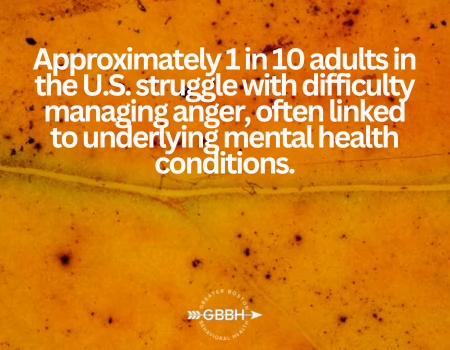Anger is a natural emotion, but when it becomes overwhelming or uncontrollable, it can negatively affect mental health, relationships, and overall well-being. For individuals in behavioral health recovery, managing anger is a critical component of achieving long-term success. Unchecked anger can exacerbate mental health symptoms, hinder progress in recovery, and strain personal relationships. On the other hand, learning to understand and regulate anger can empower individuals to navigate challenges with resilience and maintain emotional balance.
We all understand hunger as a normal human emotion. However, managing it correctly is equally important as lack of care can damage one’s relationship. When it comes to Behavioural Health in Boston, managing anger plays a major role in active recovery. Addressing this emotion through structured programs not only helps individuals regain control over their lives but also fosters long-term emotional stability.
Understanding Anger Management Programs
An anger management program is designed to help individuals identify triggers, manage their responses, and develop healthier ways to express anger. These programs are particularly effective when integrated with other mental health therapy programs such as DBT Therapy (Dialectical Behavior Therapy) and CBT Therapy (Cognitive Behavioral Therapy). These evidence-based approaches target the root causes of emotional dysregulation, providing tools to cope with intense feelings and reactions.
For residents seeking support, a mental health treatment center in Boston offers comprehensive resources to address these challenges. From group therapy sessions to individual counseling, these centers ensure that individuals struggling with anger receive tailored support to foster recovery.
How Anger Affects Mental Health
- Heightened Stress: Prolonged anger increases cortisol levels, leading to chronic stress and physical health issues.
- Emotional Dysregulation: Intense anger can overwhelm emotional control, contributing to impulsive or harmful behaviors.
- Strained Relationships: Unmanaged anger often results in conflicts with loved ones, colleagues, or peers.
- Exacerbation of Mental Health Symptoms: Conditions like anxiety, depression, and trauma-related disorders may worsen when anger is not addressed.
The Role of Anger Management in Behavioral Health Recovery
Effective anger management is a cornerstone of recovery for individuals dealing with mental health challenges or co-occurring disorders. Addressing anger is essential for improving emotional regulation, enhancing interpersonal relationships, and supporting overall recovery goals.
1. Enhancing Emotional Regulation
Anger often stems from emotional dysregulation, where individuals struggle to process and manage their feelings. Skills learned in an Anger Management Program empower individuals to:
- Recognize anger triggers.
- Respond to anger with mindfulness and calmness.
- Develop healthier coping mechanisms for emotional stress.
2. Improving Relationships
Uncontrolled anger can damage personal and professional relationships, leading to isolation or conflict. Anger management teaches communication and conflict-resolution skills that foster stronger, healthier connections.
3. Supporting Co-Occurring Mental Health Disorders
For individuals with conditions such as depression, anxiety, or PTSD, addressing anger can reduce symptom severity and improve treatment outcomes. Integrated care through programs like Mental Health Treatment Programs ensures comprehensive support.
4. Preventing Relapse
In recovery from substance use disorders or behavioral health challenges, unmanaged anger is a common relapse trigger. Learning to regulate anger reduces the risk of returning to harmful behaviors.
The Link Between Anger and Behavioral Health Recovery
Unmanaged anger can act as a significant barrier in behavioral health recovery. It can lead to strained relationships, poor decision-making, and even physical health issues. Incorporating anger management in recovery helps individuals:
- Identify Triggers: Recognizing situations, thoughts, or memories that provoke anger is a crucial first step.
- Develop Coping Mechanisms: Techniques such as mindfulness and relaxation exercises can defuse anger before it escalates.
- Improve Communication: Learning how to express emotions constructively strengthens interpersonal relationships.
- Prevent Relapses: For individuals recovering from substance abuse or other behavioral health issues, managing anger reduces the risk of falling back into destructive patterns.
Evidence-Based Therapies for Anger Management
At GBBH, we utilize evidence-based therapies to address anger as part of a holistic approach to recovery. These therapies are tailored to individual needs, ensuring effective outcomes.
1. Cognitive Behavioral Therapy (CBT)
CBT is a proven method for managing anger by addressing the thoughts and beliefs that fuel emotional reactions. Through CBT, individuals learn to:
- Identify negative thought patterns that trigger anger.
- Reframe these thoughts into constructive, balanced perspectives.
- Practice problem-solving skills to address underlying frustrations.
2. Dialectical Behavior Therapy (DBT)
DBT, a form of CBT, focuses on emotional regulation and interpersonal effectiveness. It is particularly effective for individuals with intense emotional responses or borderline personality disorder. Key DBT techniques include:
- Mindfulness to increase awareness of anger triggers.
- Distress tolerance to manage anger without impulsive actions.
- Interpersonal effectiveness to handle conflicts calmly and assertively.
3. Group Therapy
Group therapy provides a supportive environment for individuals to share experiences, practice skills, and gain feedback. It also reduces feelings of isolation by connecting individuals with others facing similar challenges.
4. Trauma-Informed Care
For individuals whose anger is rooted in past trauma, a Trauma Therapy Program helps process these experiences and develop healthier responses.
Benefits of Anger Management in Behavioral Health Recovery
Incorporating anger management into a comprehensive recovery plan offers numerous benefits, including:
1. Improved Emotional Well-Being
Learning to regulate anger reduces emotional distress and fosters a sense of control over one’s feelings.
2. Stronger Relationships
Effective communication and conflict-resolution skills enhance relationships with family, friends, and colleagues.
3. Better Mental Health Outcomes
Addressing anger as part of a broader recovery plan can reduce symptoms of anxiety, depression, and trauma-related disorders.
4. Enhanced Resilience
Anger management equips individuals with tools to handle stress and adversity without resorting to harmful behaviors.
5. Sustainable Recovery
For individuals recovering from substance use or behavioral health challenges, anger management reduces relapse risk and supports long-term success.
Role of Therapy in Anger Management
Both DBT Therapy and CBT Therapy are instrumental in addressing anger.
- DBT Therapy focuses on emotional regulation, distress tolerance, and mindfulness. By teaching skills to tolerate discomfort without acting impulsively, DBT fosters healthier responses to anger.
- CBT Therapy helps individuals reframe negative thought patterns that fuel anger. For instance, someone might learn to challenge the belief that they are always being disrespected, replacing it with more balanced perspectives. This cognitive restructuring is a cornerstone of behavioral health recovery.
Integrating these therapies within mental health treatment programs ensures a holistic approach to recovery. In Boston behavioral health centers, therapists often combine DBT and CBT with other interventions to meet the unique needs of each patient.
Why Behavioral Health in Boston Prioritizes Anger Management
Boston behavioral health services emphasize the importance of addressing anger as part of a comprehensive recovery plan. The city’s diverse population and bustling environment present unique stressors that can exacerbate emotional challenges. Recognizing this, many mental health treatment programs in Boston incorporate anger management as a core component.
A mental health treatment center in Boston often offers:
- Individual Counseling: One-on-one sessions to explore the roots of anger and develop personalized coping strategies.
- Group Therapy: Shared experiences and peer support can reduce feelings of isolation while fostering accountability.
- Workshops and Classes: Educational programs to teach anger management techniques, such as deep breathing, journaling, and conflict resolution.
Long-Term Benefits of Anger Management
Effective anger management has far-reaching benefits for individuals in recovery. It not only enhances emotional well-being but also strengthens relationships, boosts self-esteem, and promotes physical health. When individuals learn to control their anger, they are better equipped to handle life’s challenges without resorting to harmful behaviors.
For example, someone recovering from substance abuse might initially use anger as a justification for relapse. With the skills gained from an anger management program, they can navigate triggering situations more effectively, thereby staying on the path to recovery.
Finding Support in Boston
If you or a loved one is struggling with anger and its impact on mental health, seeking help from a mental health treatment center in Boston is a crucial step. These centers offer a variety of mental health therapy programs, including specialized anger management programs, to support your journey toward recovery. Combining therapies like DBT Therapy and CBT Therapy with a supportive environment ensures that individuals receive the care they need to thrive.
Conclusion
Anger is a complex emotion, but it doesn’t have to control your life. With the right tools and support, managing anger can become a stepping stone to a healthier, more balanced future. In Boston behavioral health settings, anger management is more than just a therapy – it’s a transformative process that empowers individuals to reclaim their lives. Don’t wait to seek the help you need. Explore the resources available through mental health treatment programs in Boston today and take the first step toward lasting recovery.
Contact Greater Boston Behavioral Health today at (888)278-0716 to learn more about our Anger Management Program, Mental Health Therapy Programs, and other recovery services. Together, we’ll help you build a healthier, more balanced future.
FAQ on Role of Anger Management
What is an anger management program?
An anger management program teaches individuals how to identify anger triggers, manage emotional responses, and develop healthy coping mechanisms to prevent destructive behavior.
Why is anger management important in behavioral health recovery?
Uncontrolled anger can worsen mental health symptoms, damage relationships, and increase the risk of relapse. Learning to manage anger is essential for achieving emotional stability and long-term recovery.
How does CBT help with anger management?
Cognitive Behavioral Therapy (CBT) helps individuals identify negative thought patterns that fuel anger and replace them with constructive, balanced perspectives.
What role does DBT play in anger management?
Dialectical Behavior Therapy (DBT) teaches emotional regulation, distress tolerance, and interpersonal skills, helping individuals handle anger without impulsive reactions.
Can anger management improve relationships?
Yes, anger management provides tools for effective communication and conflict resolution, fostering healthier relationships with family, friends, and colleagues.
What services does Greater Boston Behavioral Health offer for anger management?
We offer Anger Management Programs, Mental Health Therapy Programs, DBT Therapy, and Family Therapy Programs to address anger as part of a comprehensive recovery plan.


